


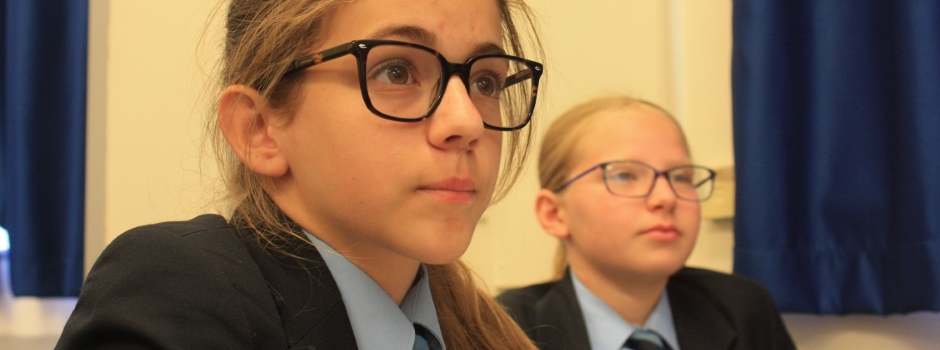
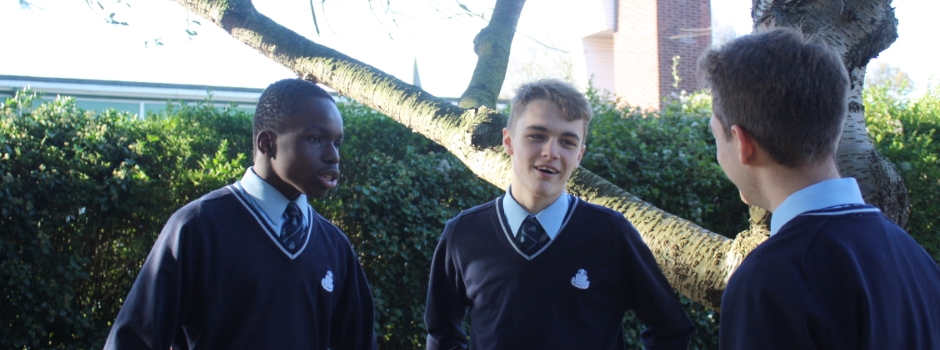



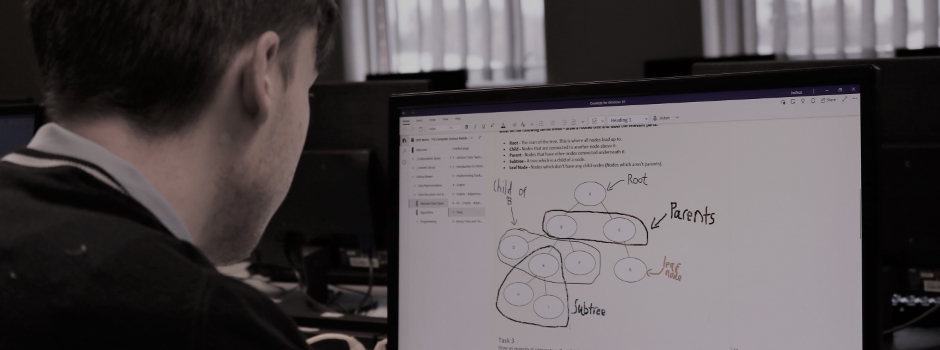






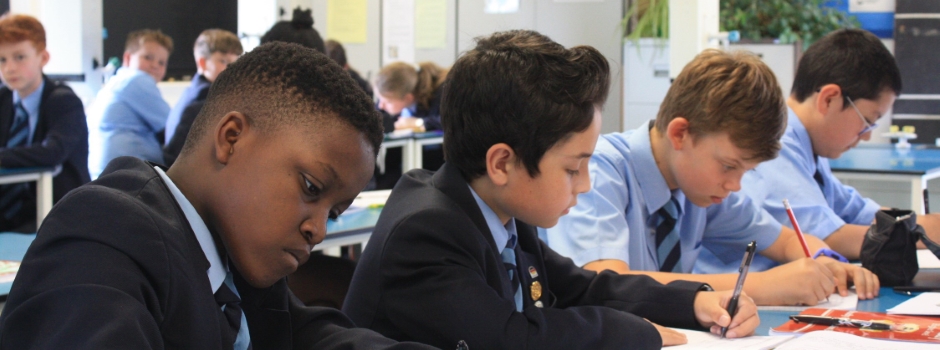









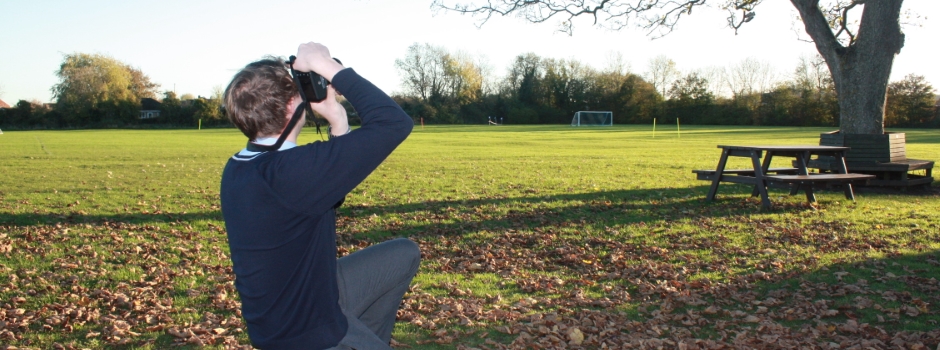









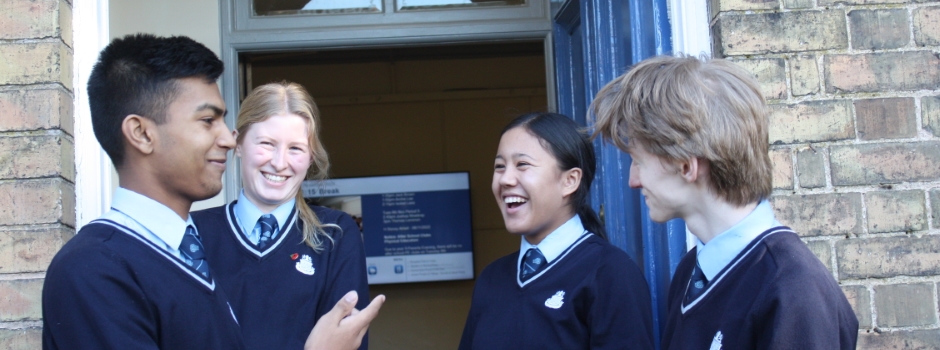

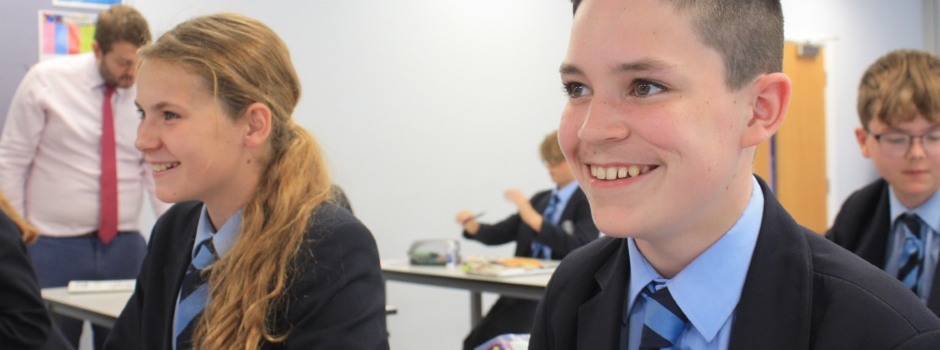



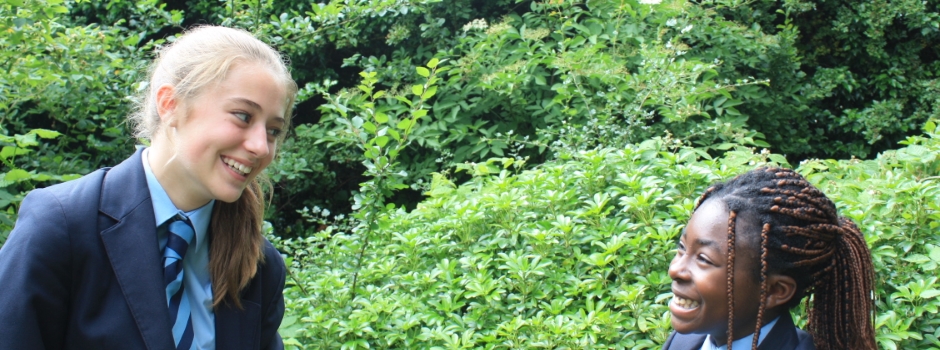






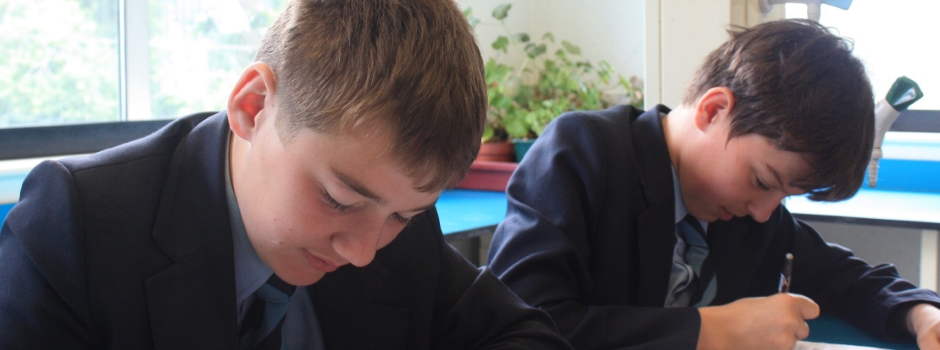
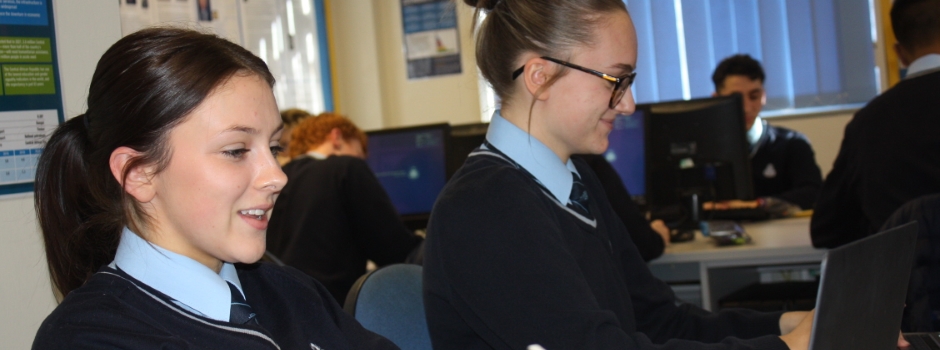


"The support from staff and students allows you to exceed your expectations."
Year 12 - Curriculum on a Page
Showing the curriculum by year
Year 12
Curriculum Details - 2023/2024 (Current)
| Subject | Term 1 | Term 2 | Term 3 | Term 4 | Term 5 | Term 6 |
| Art | Introduction to A-Level course. Experimental drawing, creating drawing tools, using ink, charcoal and mixed media techniques. Analysis and group discussions about historical and contemporary artists. Looking at landscape and producing a mixed media landscape slice. | Transformation and decay. Development of ideas on theme. Printing, layering, collage, collographs. Pupils will work in A3 sketchbooks to develop ideas around the key theme working from a range of primary and secondary source images. | Transformation and Decay continued. Further development of mixed media pieces and introduction to 3D techniques and using clay. Preparation for Yr 12 exam linked to theme. Creation of a glazed ceramic piece. | Exam review. Personal Investigation from a choice of themes. Visual mind mapping, recording, developing ideas and investigation into the work of other artists. Pupils will develop their own work independently practising skills needed for their Final Personal Investigation. | Independent project continuation. Completion of a major final piece by May half term. Start to produce preparation work for Summer exam linked to ideas in final piece. | Exam preparation work and completion of 5 hour exam piece. Introduction to Final Personal Investigation and planning for Personal Study essay. Discussion on chosen theme, collecting primary and secondary resources and taking photographs linked to theme. |
| Biology | Biological molecules: carbohydrates, proteins, water, enzymes and ATP. Required Practicals 1 & 11. | Biological molecules: lipids. Digestion. Structure of viruses, prokaryotic and eukaryotic cells and their membranes. Cell division (mitosis) and cell transport. Required Practicals 2,3 & 4 | Cell recognition and the immune system. Biological molecules: DNA and RNA. | Gas exchange and mass transport in animals and plants. Required Practical 5 | DNA and protein synthesis. Genetic diversity due to mutations and meiosis. Selection and speciation. Required Practical 6 | Taxonomy and biodiversity. Respiration and photosynthesis. Required Practicals 7,8 & 9. |
| Business (Applied) | Unit 1 Exam - Financial planning and analysis: Business planning, legal structures, financing the enterprise, costs and revenue, making a profit, break-even and cash flow. Unit 2 Coursework - Dynamic nature of Business: Understand business organisations. P1, P2, P3, M1, M2. | Unit 1 Exam - Financial planning and analysis: budgets, using break-even, interpreting financial data, interpreting financial ratios, market information and stakeholder perspectives. Unit 2 Coursework - investigate current business advantages. P4, P5, P6, M3, M4, M5, D1, D2. | Unit 2 Coursework - Dynamic nature of Business: consider business dynamics. P7, P8, M6, M7, D3, D4. | Unit 2 Coursework - Dynamic nature of Business: assess business potential. P9, P10, M8, M9, D5, D6. Unit 3 - Entrepreneurial Opportunities: understanding enterprising behaviour. Investigate customer value propositions for personal enterprise. | Unit 3 - Entrepreneurial Opportunities: Consider marketing and operations activities for personal enterprise. Review the risks and uncertainties of personal enterprise. | Unit 5 - Developing a Business Proposal: Investigate potential business ideas. P1, P2, M1, M2, D1. |
| Business Studies | Unit 1: Introduction to business- objectives, ownership types and external influences on a business. Unit 2: Managers, leadership and decision making-Understanding the roles of managers and leadership styles. Understanding the scientific decision making method- decision trees. | Unit 2: Analysing stakeholder influence. Unit 3: Marketing- Understanding key marketing objectives and marketing data, including research methods and elasticity. Analysing STP (Segmenting, Targeting and Positioning) and the 7 P's of the marketing mix. | Unit 4: Operational performance- Identifying key operational objectives and data. Analysing how to improve efficiency, productivity, quality and supply chain management. | Unit 5: Financial performance: Identifying key financial objectives and calculating financial forecasts including budgets, cash flow and break even. Calculating profit margins and evaluating appropiate sources of finance for difference purposes. | Unit 6: Human Resource performance: Identifying key financial objectives and data. Analysing how to manage and improve organisational design, the human resource flow and motivation and engagement. Understanding ways to improve employer- employee relations. | June 12 exam: Starting year 2 content 7.1 & 7.3, Mission statements, SWOT analysis and undersatnding how to analyse the overall performance of a business. |
| Chemistry | Atomic structure, bonding and intermolecular forces, shapes and bond angles in covalent molecules, amount of substance. | Amount of substance continued incl. required practical (titration), periodicity, introduction to organic chemistry. | Properties and reactions of the alkanes and halogenoalkanes, Energetics incl. required practical and Hess's cycles. | Reduction and oxidation, Group 2 Chemistry, Group 7 Chemistry incl. required practical activity, Properties and reactions of Alkenes (including E/Z isomerism), introduction to alcohols. | Chemical Equilibria (including Kc), Oxidation of alcohols incl. required practical activity, Organic Analysis: instrumental (Mass spec. and infra red) and test tube identification tests incl. required practical. | Thermodynamics: entropy and Born Haber cycles AS examination preparation and completion. |
| Computer Science | Data Representation - Sets and Bases, Floating Point Binary, Compression and Encryption. Data structures - Creating ways of storing data that represent behaviours - Stacks, graphs. Programming. | Data structures - trees. Algorithms - Reverse Polish Notation, Dijkstra's algorithm. Programming. Programming - covering simple concepts to ensure good use from GCSE work. Sequence, Selection and Iteration. Using inbuilt as well as creating functions. | Data structures - Queues, dictionaries, hash tables, vectors. Algorithms - Searching, sorting, efficiency. Databases design and normalisation. Programming. Programming Tasks - tasks that help review some of the theory topics already covered to build on programming skills. | Databases - SQL queries. Table creation, insertion/updating of data, retrieval of data. Programming paradigms and a focus on Object Oriented Programming. | Databases - RDBMS and Concurrent access. CRUD, REST, JSON and XML. Theory of computation - Regular Expressions, Finite State Machines, Mealy Machines, Turing Machines and Big O notation. | Big Data and Functional Programming. Programming Project |
| DT: Product Design | Paper 1 L 01-Introduction-to-the-course Theory L 02-1.1 Materials and applications L 03 1.2 Materials and Applications Timber and manufactured boards L 05-6-1.2 Materials and applications Metals and alloys Mini NEA | Paper 1 L 07-8 1.2 Materials and applications Polymers L 09-10 1.2 Materials and applications Paper and Board L11 1.1 Materials and applications Composite materials Mini NEA | Paper 1 L12-13- 1.1 Materials and applications Smart and modern materials L14-1.1 Materials and applications Glass, ceramic and textiles L15-Testing Mini NEA | Paper 1 L16-Enhancement-of-materials L17-Wasting-processes L18-19-Redistribution L20-21-Fabrication NEA | Paper 1 L22-23-Finishes L24-25-Modern-scales-of-production L26-27-Digital-design-and-manufacture L28-30-Requirement-for-product-design NEA | Paper 1 L31-32-Health-and-safety L33-Protecting-designs L34-35-Design-for-manufacture L36-Feasibility-studies L37-38-Enterprise NEA SECTION C |
| Economics | Microeconomics - The Nature of Economics & How Markets Work is the start of the course with specific reference to the fundamental economic problem, economic agents and psychology, demand, supply, price mechanism and elasticities. | We examine further Microeconomics with how Market Failure occurs and model it using demand and supply diagrams. We then examine how the government intervenes in the operation of markets and how this can lead to another form of market failure, that being Government Failure. | This term we start Macroeconomics by examining measures of economic performance, AD, AS and National Income. The key performance indicators (KPI's) of Economic growth, inflation, unemployment and the balance of payments are examined and how this affects the national equilibrium of where AD = AS. | Macroeconomic Objectives of Governments are identified. We examine the targets that the Government sets for the KPI's and recognise that external events can influence the relative importance of each objective. | In this term we examine the policies that a Government can use to influence the KPI's. These are Fiscal Policy, Monetary Policy and Supply Side Policy. Each of these have a series of tools and we evaluate the extent to which these can be more or less effective. | In this term we examine the combination of both micro and macroeconomics in answering synoptic Paper 3 questions. For example the oil market can be examined using demand , supply and elasticities for microeconomics and then examined as an example of cost-push inflation upon the macroeconomy. |
| English Language | Introduction to Spoken Language (Component 1) Early Modern English, language change and standardisation (Component 1-2) | Spoken Language (Component 1) Language Change, standardisation and varieties of English (Component 1-2) | Language Issues: Language and power and Language and Situation (Component 1) English in the 21st Century (Component 2) | Child Language Acquisition (Component 1) English in the 21st Century (Component 2) | Child Language Acquisition (Component 1) Introduction to language change in written texts (Component 2) | Preparation for the NEA (Component 4) - Language and Identity. |
| English Literature | Paper 1 - Novel (The Great Gatsby) and poetry study for the comparative Love Through the Ages question; Unseen poetry | Paper 1 - Novel and poetry study for the comparative Love Through the Ages question Paper 2 - Modern poetry (Owen Sheers) | Paper 2 - Comparative play and novel study (Cat on a Hot Tin Roof and One Flew Over the Cuckoo's Nest) and poetry (Sheers) | Paper 1 - Unseen Poetry Paper 2 - Comparative play and novel study and poetry. | Non-Exam Assessment | Non-Exam Assessment |
| French | La famille en voie de changement Discuss trends in marriage, partnerships. Consider the merits and problems of different family structures and problems that can arise between different family generations. Grammar: imperfect tense, perfect tense, recognising the past historic | La cyber-société How has technology transformed everyday lives, what are the dangers of digital technology, who are the users of technology and what possible developments could there be Grammar: infinitive constructions, object pronouns, present tense | Le rôle du bénévolat Explore the voluntary sector in France and discuss the benefits for those who help and those who are helped. Grammar: connectives, conditional, si clauses, future tense | Une culture fière de son patrimoine Explore the notion of heritage and preservation on a regional and national scale, consider how famous heritage sites market themselves, how does heritage impact and guide a society Grammar: adjectives agreements, si clauses, subjunctive | La musique francophone contemporaine Discuss the popularity of contemporary French music, its diversity of genre and style, who listens to French music and what are the threats to contemporary French music and how could it be safeguarded. Grammar: questions, subjunctive, conditional | Le septième art Consider a variety of aspects of French cinema, the major developments in the evolution of French cinema and the continuing popularity of French cinema and film festivals. Grammar: infinitive constructions, si clauses, connectives followed by the subjunctive |
| Further Mathematics | Decision Maths 1 Unit 1 - Algorithms is Summer Work set after Y12 induction day following Y11 exams Unit 6 - Linear programming Unit 2 - Graphs & networks Unit 3 - Algorithms on graphs Assessments - Unit assessments through term | Decision Maths 1 Unit 4 - Route inspection Unit 5 - The travelling salesman problem Unit 8 - Critical path analysis Unit 7 - The simplex method Assessments - Unit assessments through the term | Decision Maths 1 Unit 7 - The simplex method concluded Revision January Y12 Exams in lessons Core Pure 1 Unit 3 - Series Unit 1 - Complex numbers Unit 2 - Argand diagrams Assessments - Unit assessments through the term | Core Pure 1 Unit 2 - Argand diagrams concluded Unit 4 - Roots of polynomials Unit 5 - Volumes of revolution Unit 6 - Matrices Unit 7 - Linear transformations Assessments - Unit assessments through the term | Core Pure 1 Unit 7 - Linear transformations concluded Unit 8 - Proof by induction Unit 9 - Vectors Assessments - Unit assessments through the term | Revision Y12 June exams Unit 7 - Vectors concluded Further Statistics 1 Unit 1 - Discrete random variables Unit 2 - Poisson Distribution Unit 4 - Hypothesis Testing Y12 content only Unit 6 - Chi-squared distribution Y12 content only Assessments - Unit assessments through the term |
| Geography | 3.1.1 Water and carbon cycles 3.1.1.1 Water and carbon cycles as natural systems 3.1.1.2 The water cycle 3.1.1.3 The carbon cycle | 3.1.1.3 The carbon cycle 3.2.2 Changing places 3.2.2.1 The nature and importance of places 3.2.2.2 Changing places - relationships, connections, meaning and representation 3.2.2.2.1 Relationships and connections 3.2.2.2.2 Meaning and representation | 3.2.2.3 Quantitative and qualitative skills 3.2.2.4 Place studies 3.2.3 Contemporary urban environments 3.2.3.1 Urbanisation 3.2.3.2 Urban forms | 3.2.3.3 Social and economic issues associated with urbanisation 3.2.3.4 Urban climate 3.2.3.5 Urban drainage 3.2.3.6 Urban waste and its disposal 3.2.3.7 Other contemporary urban environmental issues | 3.2.3.8 Sustainable urban development 3.2.3.9 Case studies 3.1.5 Hazards 3.1.5.1 The concept of hazard in a geographical context 3.1.5.2 Plate tectonics | 3.1.5.3 Volcanic hazards 3.1.5.4 Seismic hazards 3.1.5.5 Storm hazards 3.1.5.6 Fires in nature 3.1.5.7 Case studies |
| German | Changing nature of relationships and families ? new trends, same-sex couples, single-parent/blended families, change in roles. Present tense Modal verbs Perfect tense Understanding word formation | Fashion and importance of image Different genre and styles of music Popularity of contemporary music – who and how? Different types of TV programmes Using pronouns, verbs that are followed by prepositions and the imperative | Study of a film, directed by a German speaking director Discuss theme, character, social and cultural context in film. Develop essay writing skills and style. Development of complex language and essay structure. | Roots and origins of festivals and traditions in German speaking countries. Develop understanding of economic and social importance of these festivals/traditions. Passive voice Imperfect tense Separable and inseparable verbs. Reflexive verbs | Developments in art and architecture from the past to the present and towards the future. Using the pluperfect tense | Influence of political events on Berlin Role of culture in Berlin today Aspects and challenges of life in a multicultural city. Adjectival endings Infinitive constructions with/without « zu » Imperfect subjunctive in conditional clauses |
| History | British Experience of Warfare - Breadth study on army and naval reforms and growing importance of civilians in warfare. Russia - Nature of the Tsarist regime, opposition and its lack of success and the 1905 Revolution | British Experience of Warfare - Depth Study on Napoleonic Wars; the importance of Wellington, Nelson and economic growth. Russia - Tsarist recovery, Stolypin's repression and reforms, impact of WW1 and the February Revolution | British Experience of Warfare - Depth Study on the Crimean War; emphasis on army capabilities, the role of early reporting and the work of Nightingale and Seacole. Russia - Provisional Government and the Soviet, Lenin's return and crises facing the Government | British Experience of Warfare - Depth Study on the Second Boer War, focusing on public reaction and the contributions of military commanders (e.g. Roberts). Russia - October Revolution, Bolshevik 1st year in power, repression and economic policies | British Experience of Warfare - Depth Study on the Great War; emphasis on development of stalemate, the role of Sir Douglas Haig and the importance of propaganda. Russia - Civil War and foreign intervention, revision for exam | British Experience of Warfare - Depth Study on the air war during the Great War. focusing on its growing importance and influence. Stuarts - Politics 1624-1660 (Charles I, Civil War, Interregnum and the Restoration) |
| Mathematics | Pure Maths Algebra basics, Linear and quadratic equations including solving equations and inequalities, Trigonometric ratios. Assessments - Unit assessments through the term | Pure Maths Graphs and transformations, Algebraic methods, Trigonometric identities and equations, straight line graphs and circles. Assessments - Unit assessments through the term | Pure Maths Review of Term 1 & 2 topics, differentiation, the binomial expansion and logs and exponentials. Assessments - Unit assessments through the term | Pure Mats Logs and exponentials continued and integration. Applied Maths Mechanics - Introduction to mechanics and uniform acceleration. Statistics - Data collection, correlation and regression. Assessments - Unit assessments through the term | Applied Maths Mechanics - Forces and motion and variable acceleration Statistics - Measures of location and spread, the binomial distribution and hypothesis testing. Assessments - Unit assessments through the term | Review of Terms 1 to 5 topics. Revision. Y12 June end of year exams. Pure Maths Y13 topics started algebraic methods, functions and graphs. Assessments - Unit assessments through the term |
| Music | Set works and Composition - Area of Study A: Introduction to Sonata Form - Students will continue to develop analysis skills through analysis of Haydn 104 Mov. I. They will be introduced to sonata form and begin composing in this structure. | Set works and Composition - Area of Study A: Introduction to Sonata Form - Students will continue to develop analysis skills through analysis of Haydn 104 Mov. I. They will be introduced to sonata form and begin composing in this structure. | Optional Area of Study B (Popular Music), C (Musical Theatre), D (Jazz). Study the forms and devices of the chosen area and their importance within musical history. A wide range of listening and knowledge of historical events and movements is part of this study. Composition in style of chosen AoS. | Optional Area of Study B (Popular Music), C (Musical Theatre), D (Jazz). Study the forms and devices of the chosen area and their importance within musical history. A wide range of listening and knowledge of historical events and movements is part of this study. Composition in style of chosen AoS. | Optional Area of Study E (20th C), F (21st C) Study the forms and devices of the chosen area and their importance within musical history. A wide range of listening and knowledge of historical events and movements is part of this study as well as a set work. Composition in style of chosen AoS. | Optional Area of Study E (20th C), F (21st C) Study the forms and devices of the chosen area and their importance within musical history. A wide range of listening and knowledge of historical events and movements is part of this study as well as a set work. Composition in style of chosen AoS. |
| Philosophy and Ethics | AQA Ethics: Situation Ethics Natural Moral Law Aristotle’s Virtue Ethics Conscience | Ethics: Utilitarianism Kantian Ethics Free will and moral responsibility | Ethics: Meta-ethics Application to issues of human life and animal life | Philosophy: The Problem of evil Miracles Self, death and afterlife | Philosophy: Religious experience Arguments for the existence of God: The Design Argument, The Cosmological Argument | Philosophy: Religious language Arguments for the existence of God: The Ontological Argument |
| Physics | Quantities and units, derived units, scalar and vector quantities, adding and resolving vectors, current and charge, moving charges, Kirchoff's first law, mean drift velocity | Distance, displacement and velocity, acceleration, equations of motion, free fall, projectile motion, circuit symbols, potential difference and electromotive force, resistance, resistivity, Required practicals 1 and 3. | Force, mass and weight, drag and terminal velocity, moments, couples and torques, triangle of forces, Archimedes' principle, Kirchoff's laws, combining resistors, internal resistance, potential divider, Required practical 4. | Work done and conservation of energy, kinetic and gravitational potential energy, power and efficiency, progressive waves, wave properties, reflection, refraction, diffraction and polarisation, intensity, EM waves, refractive index, total internal reflection, Required practical 6. | Springs and Hooke's law, elastic potential energy, deforming materials, stress and strain, Young modulus, superposition and interference, Young's double slit experiment, stationary waves, harmonics, Required practicals 2 and 5. | Newton's first and third laws, linear momentum, Newton's second law, impulse, collisions in two dimensions, the photon model, photoelectric effect, Einstein's photoelectric effect equation, wave-particle duality. |
| Pre-Teaching | What makes a good teacher? What makes a good lesson? Different kinds of schools and how they function. | Placement in schools 3 days. Professional standards, life as a new teacher, functional tests. Safeguarding. | Planning trips, G&T, Role of SENDCo. School placement - 3 days. | Communication, Life as a tutor. Trip to a teaching university. | Pulling together portfolio of evidence for assessment in this term. Throughout, you will support a KS3 group with a focus on classroom management and teaching and learning. | No lessons this term. |
| PSHE | Transition and study skills- Focus on the demands of A Level study and the study skills that will be required. Recognition of Black history month through cultural and racial tutorial. Wellbeing- understanding your own mental health. | Healthy relationships: An examination of the different types of relationships appropriate to their age including sexual relationships, consent and the risks of STIs. Personal safety online and offline. | Revision prep and guidance for the January exams. Understanding different types of identity including sexual and gender identities. | Careers: Review of middle school career work and planning ahead for the UCAS discovery day. Understanding current affairs- presentations and debates. | Personal Health: Physical personal health and road safety awareness. Prep for June exams. | Post Sixth Form options: Beginning of UCAS applications and apprenticeships. To include creation of personal statements and beginning of applications. |
| Psychology | Social Influence - Types/explanations of conformity, obedience, resistance to social influence and the role of social influence processes in social change. Studies - Asch, Zimbardo, Milgram. Research methods - experimental methods, scientific processes, data handling and analysis | Attachment - Caregiver-infant interactions in humans, animal studies, types/explanations of attachment and the influence of early attachment on relationships. Studies - Schaffer, Lorenz, Harlow, Bowlby. Research methods - experimental methods, scientific processes, data handling and analysis | Psychopathology - Definitions of abnormality, the behavioural/emotional/cognitive characteristics of phobias, depression and OCD. Studies - Beck, Ellis, Jahoda, Research methods - experimental methods, scientific processes, data handling and analysis | Memory - The multi-store model of memory, long-term memory, working memory model, explanations for forgetting/accuracy of eyewitness testimony Studies - Peterson and Peterson, Baddeley, Loftus and Palmer Research methods - experimental methods, scientific processes, data handling and analysis | Approaches - Learning and comparison of the different approaches (behaviourist, cognitive, biological, psychodynamic) Studies - Wundt, Pavlov, Skinner, Bandura, Maslow Research methods - experimental methods, scientific processes, data handling and analysis | BioPsychology (Year 12) - the nervous and endocrine system, flight/fight response, ways of studying the brain and biological rhythms. Research methods - experimental methods, scientific processes, data handling and analysis |
| Sociology | Families and Households: Theories, social change and state policy. Gender roles, domestic labour and power relations in the family. Childhood and changing status of children. | F&H: Changing patterns of marriage. Personal life and diversity of families and households. Demographic trends since 1900. Migration and globalisation. Education and training: Sociological theories about the role and function of education. Differential achievement by class, gender and ethnicity. | Education continued: Relationships and processes in schools: labelling, setting, subcultures, hidden curriculum. Educational polices and globalisation. | Methods of research: primary and secondary, practical, ethical and theoretical issues that influence topic and method. Theory of research: positivism and interpretivism. | Is sociology a science? Links to the theoretical side of research. | Sociological theories-not linked to topics: Consensus and Control theories, Social Action Theories, Postmodernism and Late Modernism. |
| Spanish | Modern & traditional values Changes in the family, attitudes toward marriage and divorce, the influence of the Catholic church Grammar: imperfect, imperfect continuous and preterite | Cyberspace The influence of the internet, smart phones in our society, social networks: benefits and dangers Grammar: present and present continuous, comparatives and superlatives, SER, ESTAR, future and conditional | Equality Women in work, sexism and feminism, gay and transgender rights Grammar: perfect and pluperfect tense, future perfect and conditional perfect | The influence of idols Singers and music, stars of TV and cinema, role-models Grammar: indirect object pronouns, passive voice | Regional identity in Spain Traditions and customs, gastronomy, languages Grammar: present subjunctive, perfect tense in subjunctive | Cultural heritage Historic sites and pre-hispanic civilisations, art and architecture, musical heritage and diversity Grammar: subjunctive, imperatives, demonstrative pronouns |